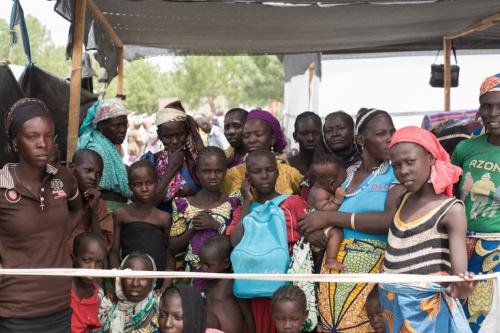UNHCR and partners seek US$157 million to aid Boko Haram displaced
UNHCR, the UN Refugee Agency, together with humanitarian partners, on January 31, launched an inter-agency funding appeal for US$157 million to help over a quarter of a million people affected by the Boko Haram insurgency in the Lake Chad Basin region.

After returning to Nigeria from Cameroon, families wait to receive emergency food items, mattresses and shelter materials in Banki, in north-east Nigeria, May 2017.
The 47 UN agencies and humanitarian organizations, who joined the 2018 Nigeria Regional Refugee Response Plan (RRRP), will cater for the needs of some 208,000 Nigerian refugees and 75,000 of their hosts in Niger, Cameroon and Chad.
“The Boko Haram crisis lingers on and is far from over,” said UNHCR’s Deputy High Commissioner Kelly T. Clements, while launching the funding appeal to donors in Niger’s capital Niamey. “The world should not forget the victims of this deadly conflict, especially as there appears to be little hope for a return to peace and stability in the near future.”
Nigerian refugees continue to arrive in very remote and impoverished communities in neighbouring countries. Since it started in 2013, the Boko Haram conflict has internally displaced another 2.4 million people in northeast Nigeria, Cameroon, Chad and Niger.
One of the most devastating side effects of the conflict is the alarming rise in food insecurity and severe malnutrition populations are facing to date. Over 7.2 million people in the Lake Chad Basin region were food insecure in September 2017.
“The future of young generations in the region is at stake, as food insecurity not only affects the dignity of families, but has serious consequences on the physical and cognitive development of children,” UNHCR’s Deputy High Commissioner added.
The conflict has had a devastating impact on access to education and school attendance rates, while hundreds of schools have been forced to close throughout the region, where education levels were already amongst the lowest worldwide.
The communities hosting refugees are also in dire need of aid as their capacity to help those displaced, including through existing infrastructure for basic services, is stretched to the limit. Humanitarian assistance is needed to uplift services in a number of sectors including shelter, health, education and water and sanitation.
A Refugee Response Plan (RRP) is a UNHCR-led, inter-agency planning and coordination tool for large-scale or complex refugee situations. A similar appeal of US$241 million for 2017, was only 56 per cent funded.
Source: United Nations High Commissioner for Refugees
- 225 reads
Human Rights
Ringing FOWPAL’s Peace Bell for the World:Nobel Peace Prize Laureates’ Visions and Actions

Protecting the World’s Cultural Diversity for a Sustainable Future

The Peace Bell Resonates at the 27th Eurasian Economic Summit

Declaration of World Day of the Power of Hope Endorsed by People in 158 Nations

Puppet Show I International Friendship Day 2020

